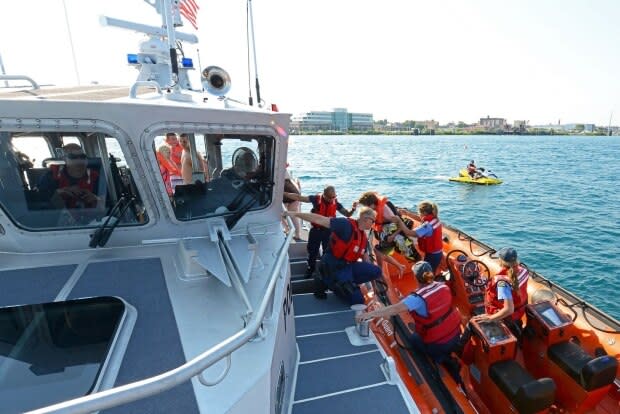Closed border, COVID-19 restrictions cloud already-rebellious Port Huron Float Down event
It's an annual tradition that almost prides itself on being rebellious and flouting the law.
But those taking part in this year's Port Huron Float Down are being warned to expect more rules and restrictions due to COVID-19.
The annual event sees thousands of people in all manner of vessels — including inflatable inner tubes and even air mattresses — float down the St. Clair River from Port Huron, Mich. to Marysville, Mich.
Municipal officials, the coast guard and shipping industry are all opposed to the party, but it goes ahead anyway. This year's edition is planned for this Sunday, August 16.
"The fast moving current, large number of participants, lack of life jackets, alcohol consumption, potentially challenging weather conditions, water temperature and limited rescue resources can create difficult emergency response scenarios that can result in serious injuries or fatalities," read a joint statement from the Canadian and U.S. Coast Guards.
Officials noted that the large gathering could cause spread of COVID-19, also pointing out that the Canada–U.S. border remains closed.
That closure is significant, considering four years ago, the wind caused 1,500 Americans to blow ashore in Sarnia, many of them without their passports handy.
"The approach that was taken [then] was nobody is getting arrested," said Sarnia Mayor Mike Bradley. "This time around it's different ... anyone that wants to take the risk and ends up here will be penalized."

The mayor's apartment overlooks the shoreline where many of the floaters lazily pass by. Bradley admits it looks like a fun time.
But this year's event falls as Canada's federal Quarantine Act is in place stipulating — among other things — anyone travelling to Canada must self-isolate for 14 days. Most Canadians won't be able to attend this year's event because they can't cross the border.
Bradley says those who may wash ashore this year will be putting everyone at risk.
"RCMP will be looking for ID and checking criminal backgrounds," he said. "The idea is they are going to get them back as quickly as possible."
Michigan reports more than 1,100 new confirmed cases of COVID-19, the highest number recorded in one day in nearly three months.
Bradley says there doesn't seem to be a "strong effort" by officials to at least restrict access to the river so that people may skip this year's float.
"It's hard to shut down but there's also been no effort [by organizers] to move it," he said.
Despite COVID-19 concerns, there was also a tragic incident in 2014 when a 19-year-old experienced swimmer drowned during the event. The U.S. Coast Guard and local, state and federal partners including the Canadian Coast Guard mounted a significant search and rescue effort that was eventually suspended after 21 searches lasting more than 36 hours.
"This is an inherently dangerous activity, especially for minors," said the release from U.S. and Canadian Coast Guards.
"As first responders, the U.S. Coast Guard and the Canadian Coast Guard recommend that people do not take part in this event."
If you choose to participate you are strongly encouraged to take several precautions:
Regardless of age or ability to swim, all participants are encouraged to wear an appropriately sized, U.S. Coast Guard / Canadian approved personal flotation device or life jacket at all times;
Bring waterproof bags for your personal items and identification;
File a "Float Plan" with someone not participating who can report your intentions to the Coast Guard in the event you do not check-in at the scheduled time;
Never go alone. Use the buddy system, keep an eye on each other, and immediately report incidents of distress to the nearest first response agency representative;
Refrain from consuming alcohol;
Wear a face mask if physical distancing is not possible;
Dress appropriately for the weather and cold water. Use a raft that limits your immersion in the water and can be controlled with oars or paddles; and
Stay near shore and remain out of the navigation channel.

